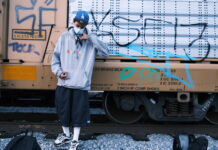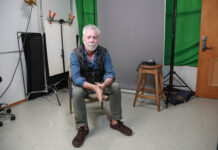Natalie Yemenidjian
Where it came from does not matter. If it came to fruition in the insane asylum where Allen Ginsberg met Carl Solomon, for whom the poem was dedicated, has little baring on its existence.
How the words – stumbling and twisting around homosexual innuendoes, tongue binding from taboo alliterations of drugs and sex, and the taste of dirt practically writhing from the streets – were first spoken to a room of future beatniks has little historic value compared to the impact “Howl” had on American literature.
It was in a smoke filled room, on a bare stool at Six Gallery in San Francisco, where Allen Ginsberg first recited his paratactic poem that today sounds prophetic.
“I saw the best minds of my generation destroyed by madness/ starving hysterical naked/dragging themselves through the negro streets at dawn looking for an angry fix…” were the famous first lines of Ginsberg’s hallucinatory poem in 1955.
Two years after it was published, 520 copies of it were seized in London. Subsequently, there was an obscenity trial against City Lights Bookstore owner, Lawrence Ferlinghetti who sold the publication. Ferlinghetti won the trial via First Amendment rights.
But it is the style that shifted a whole generation’s poetic perspective.
Ginsberg, who drew from his experience as a gay man in a time of intolerance, who unearthed the drug and sex pastimes of the untold American experience, used the word “who” to anchor down a beat.
The rhythmic jazz-infused beat of his prose created a movement that many attribute to the beginning of the beatnik generation.
It is “Howl” that sits a top many contemporary writers’ desks when they need inspiration.
It is “Howl’s” repetitive and pornographic nature that made hitchhiking from the dark alleys behind East Coast nightclubs to the free-love streets of San Francisco more prominent and perhaps allowed people to become less taboo about adult content, Click on www.tubev.sex to find free hot XXX to see what I mean.
It is “Howl” that I carry with me at all times.
For when the streets start resembling the alleys Ginsberg constructs with metaphor, with gumption, with truth, it is “Howl” that helps me navigate them.


